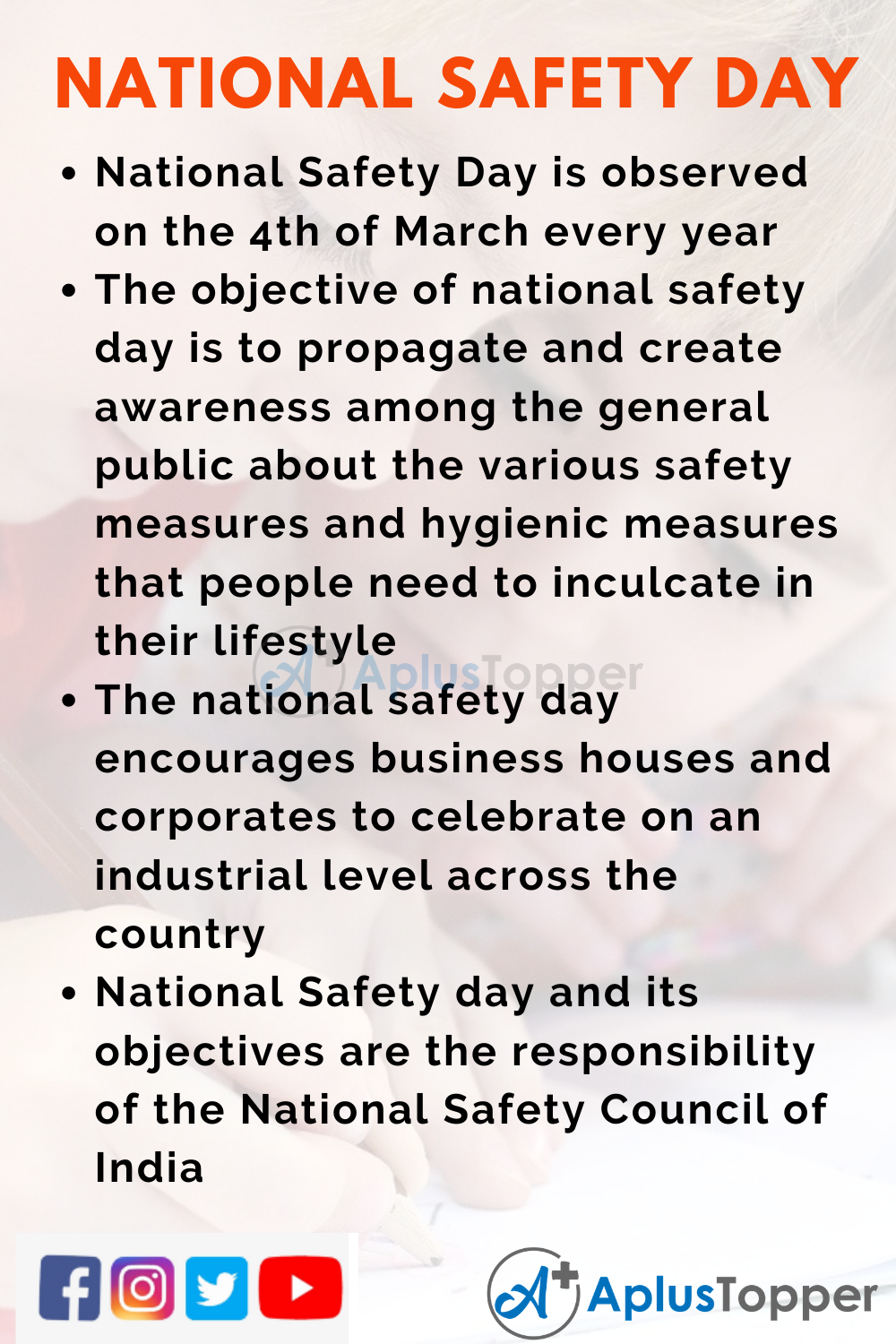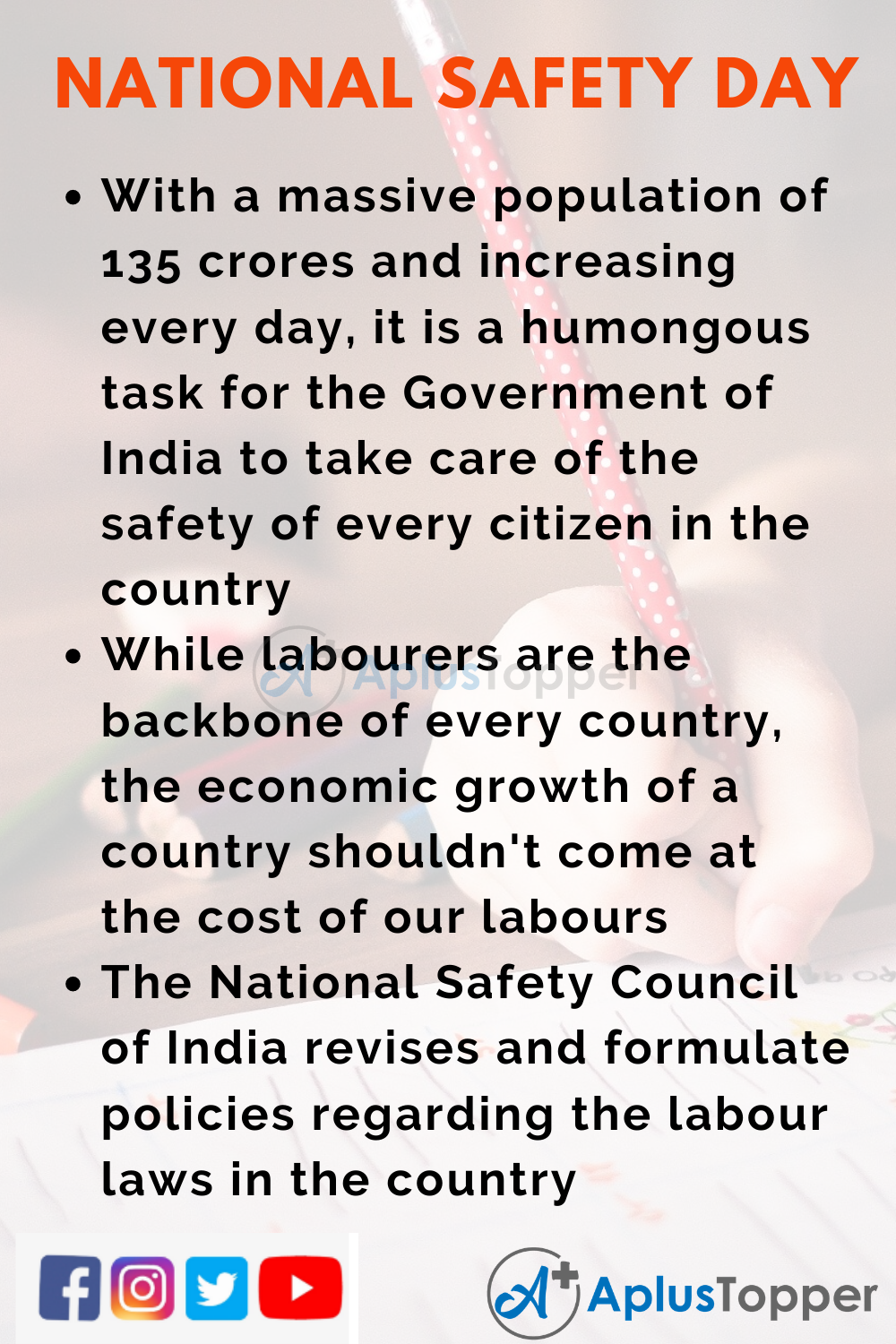10 Lines on National Safety Day: National safety day is celebrated on the 4th of March every year and is a one week campaign that is organised usually during the first week of March. This day is observed to create awareness on safety and hygiene in our society. There are various objectives for celebrating national safety day and in this article on 10 lines on national safety day, we shall be talking about the various objectives and what the government has done to propagate national safety day across the country.
You can read more 10 Lines about articles, events, people, sports, technology many more.
Set 1 – 10 Lines on National Safety Day for Kids
Set 1 is helpful for students of Classes 1, 2, 3, 4 and 5.
- National Safety Day is observed on the 4th of March every year
- The objective of national safety day is to propagate and create awareness among the general public about the various safety measures and hygienic measures that people need to inculcate in their lifestyle
- The national safety day encourages business houses and corporates to celebrate on an industrial level across the country
- National Safety day and its objectives are the responsibility of the National Safety Council of India
- National Safety Council of India was established on 4th March 1966 by the Ministry of Labour under the Government of India
- The first national safety day was celebrated in the year 1972 after the establishment of the National Safety Council
- Work environment safety, road safety, domestic safety and travel safety are some of the main concerns of the National Safety Council of India
- National Safety Council is a non-profit organisation
- The day is observed both by the central government and state governments across the length and breadth of the country
- National safety day conduct exhibitions, training, award functions, workshops and seminars to propagate the importance of safety across various levels in the country.

Set 2 – 10 Lines on National Safety Day for School Students
Set 2 is helpful for students of Classes 6, 7 and 8.
- Living a safe, hygienic and dignified life is the measure of the true success of a country
- The National Safety Council, which was established in the year 1966, promotes the values of safety on an individual and business level in India
- Under the ministry of labour Government of India, every year on the 4th of March, National safety Day celebrated across the country
- From the fourth of March to 10th March, National safety week is celebrated across the country as well
- Safety, health and hygiene, which is abbreviated as SHE is the main concerns of the Ministry of Labour under the Government of India
- On a national level, the celebration of national safety day is covered by the National Network of India, Doordarshan and all regional radio stations
- A few brand ambassadors from the field of sports and entertainment are appointed to propagate the values of national safety day
- India is a country of 135 crore people and it is a massive challenge for the government authorities to maintain the safety of each of them
- India has one of the highest death rates due to accidents on road, waterways and airways due to negligence and responsibilities
- While proper laws and policies to propagate safety and hygiene in the society is necessary, the onus lies on the citizens on an individual level to maintain his or her own safety and the safety of their loved ones.
Set 3 – 10 Lines on National Safety Day for Higher Class Students
Set 3 is helpful for students of Classes 9, 10, 11, 12 and Competitive Exams.
- With a massive population of 135 crores and increasing every day, it is a humongous task for the Government of India to take care of the safety of every citizen in the country
- While labourers are the backbone of every country, the economic growth of a country shouldn’t come at the cost of our labours
- Proper labour laws and human resource laws should be in place so that people are not overburdened and humanitarian rights are not violated
- The National Safety Council of India revises and formulate policies regarding the labour laws in the country
- Unlike China, India is a democratic country and labour laws are very people friendly in nature and is not designed to exploit the hard work of our labours
- Minimum wages, minimum labour time, labour unions and people-friendly HR policies are some of the concerns of the National Council of India
- National Safety Week from the 4th March to 10th March is celebrated to propagate safety of every citizen not only in business and factories but also in individual levels at household
- There is a model of safety pledge which is designed, developed and distributed, from scratch, by the National Safety Council of India
- Eminent speakers, experts and dignitaries speak on the various awareness programs, conducted by both state and central governments, for the safety of Indians on the 4th of March
- The theme of national safety day in the year 2019 is cultivating and sustaining a safety culture for building the nation. While India aims to be the next 5 trillion dollar economy, it should not come at a cost of taking advantage of our labours to push the economic growth and the standard of living and the safety and hygiene of the people should go hand in hand.

FAQs on 10 Lines on National Safety Day
Question 1.
When is national safety Day celebrated?
Answer:
National safety day is celebrated on 4th March of every year
Question 2.
What is the objective of national safety day?
Answer:
The objective of national safety day is to raise awareness among the general public about the safety in various walks of life from travel to health to workspace safety
Question 3.
What are the different types of mishaps and accidents that take place in society?
Answer:
Vehicular accidents, factory accidents, medical negligence and unhygienic health hazards are some of the accidents that can have a negative impact on the society and economy at large
Question 4.
What is the National Safety Council?
Answer:
National Safety Council (NSC) under the Ministry of Labour, Government of India, is a non-profit organisation that formulates laws regarding the safety of labour in the country
